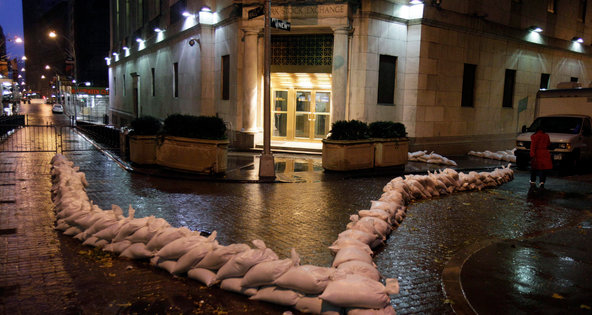 Richard Drew/Associated PressThe New York Stock Exchange, which did not open Monday.
Richard Drew/Associated PressThe New York Stock Exchange, which did not open Monday.
7:32 p.m. | Updated
Even in an era of widespread electronic trading, markets and those who tend to them are still proving vulnerable to the fury of a major hurricane.
Stock markets in the United States will be closed again on Tuesday for a second day without trading as Hurricane Sandy’s approach intensified the wind and rain in the New York area.
The New York Stock Exchange, the Nasdaq stock market and BATS Global Markets said in separate statements that they had agreed to close, after consulting with other exchanges and clients. The N.Y.S.E. added that it planned to operate on Wednesday, pending developments in weather conditions.
The stoppage is the first time the markets have been closed for consecutive days because of weather since a blizzard forced the N.Y.S.E. to close for two days in 1888. And it remained the first unscheduled market closure since the Sept. 11 terrorist attacks.
Markets in Europe and Asia were roughly flat on Monday. The FTSE 100 index closed down 0.2 percent, at 5,795, while the Hang Seng was down 0.2 percent at 21,511.05.
Hurricane Sandy Multimedia
Over all, a second day of closed markets could have a relatively limited effect on trading when business resumes, according to Larry Tabb, the founder and chief executive of the Tabb Group, a financial research firm.
An extended halt in trading could create some pent-up demand among traders that might lead to some higher volatility, he said. That could mean stocks of companies like insurers could see swings in their prices. But he predicted a short-lived effect on the markets.
In a research note published on Monday, Sam Stovall, the chief equity strategist for Standard Poor’s Capital IQ, said Hurricane Sandy would most likely not have a lasting effect on market performance. He noted that the S. P. 500-stock index rose 4 percent in the three months after Katrina, the costliest hurricane in American history.
“History says that hurricanes typically don’t trigger market declines,” Mr. Stovall wrote. “Equities are more likely driven by wider-reaching global events than localized natural disasters.”
The decision to keep the American exchanges closed came as little surprise, with market operators having already hinted that they would stay closed as the storm’s impact intensified. And the Securities Industry and Financial Markets Association, or Sifma, recommended that United States bond markets stayed closed on Tuesday as well.
The exchange closings have also meant that companies seeking to go public may need to delay their initial public offerings. That group includes Restoration Hardware, which had been hoping to raise as much as $124.8 million in its market debut.
And while 234 million shares of Facebook became eligible for trading on Monday, employees who held the stock were unable to sell. The company had moved up the expiration of a so-called lockup on the shares to help bolster staff morale.
The CME Group said that it would open its United States index futures and options markets for overnight trading, closing them at 9:15 a.m. Eastern time on Tuesday. It would also keep closed the physical trading floor of the Nymex commodities exchange, which was in a mandatory evacuation area in Lower Manhattan, but electronic trading of energy and metals would continue. On Monday, crude oil prices fell 74 cents, or 1.3 percent, to finish at $85.54 a barrel in Nymex trading.
Representatives for the exchanges emphasized that the safety of their employees was paramount, relying on skeleton crews to run critical operations. The companies have been consulting with regulators like the Securities and Exchange Commission and the Federal Reserve Bank of New York, as well as clients and Sifma.
While the N.Y.S.E. initially prepared to open for electronic trading on Monday, the exchange got some resistance from brokerages wary of using the emergency plan, which was last tested in March, according to people briefed on the matter. Market operators, trading firms and regulators ultimately decided to err on the side of caution.
A continued stoppage in trading is expected to have some costs for exchanges like the N.Y.S.E. and the Nasdaq. Richard Repetto, an analyst at Sandler O’Neill Partners, estimated in a research note that stock and option exchanges would lose about $1 million in transaction fees for every day that they are closed.
That loss of revenue will probably not hurt those companies’ earnings, Mr. Repetto said, though he added that he did not factor in lost revenue from exchanges’ other businesses.
Other Wall Street firms made contingency plans as well.
Goldman Sachs advised employees in an internal memorandum to stay home on Tuesday, and said that its offices at 200 West Street and 30 Hudson Street would be closed.
Citigroup said that its offices in evacuated parts of Lower Manhattan would remain closed.
Most of JPMorgan Chase’s offices will remain open, with smaller staffing. But the bank said it would close all of its retail branches in New York, New Jersey and Connecticut on Tuesday.
A version of this article appeared in print on 10/30/2012, on page B5 of the NewYork edition with the headline: Storm Forces Markets to Remain Closed.
Article source: http://dealbook.nytimes.com/2012/10/29/u-s-markets-to-be-closed-on-tuesday/?partner=rss&emc=rss
Speak Your Mind
You must be logged in to post a comment.